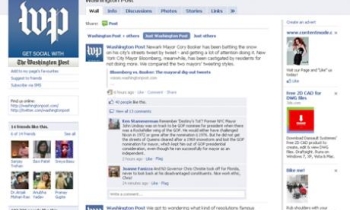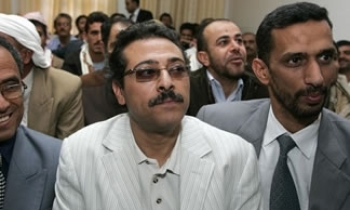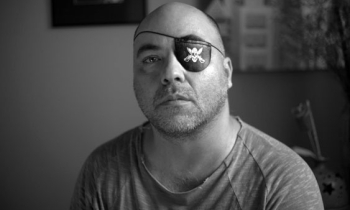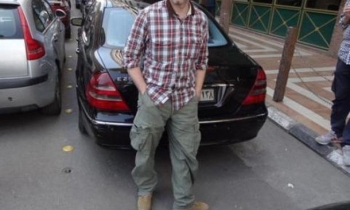I had the rare occasion, for me, of talking with a group of congressmen last week in Washington, and as our session broke up, I changed the subject abruptly.
I asked, "Could you stop the present administration from locking up reporters?"
They chuckled. The request was baldly self-serving, since I often write stories that concern national security. Perhaps they also regarded my concern as far-fetched.
It isn't. Attorney General Alberto Gonzales has made it clear that reporters can be prosecuted for violating national security, and has not ruled out going after reporters from the New York Times and Washington Post for Pulitzer Prize-winning stories revealing secret wiretapping and the existence of secret prisons for terrorism suspects.
There is no doubt that he would face a significant fight if he actually tried, and constitutional guarantees of a free press haven't collapsed in this country yet, but there is no doubt that the climate is changing in this country for journalists. Subpoenaing reporters to testify in criminal cases and jailing them for refusing is one thing - there have never been solid protections for journalists who refuse to testify in court - but prosecuting journalists for national security breaches is something else. It would be a direct assault on one of this nation's fundamental checks on power. For the first time since I started writing for a living 30 years ago, there is reason for me to fear my government.
Good reporters sometimes do reveal secrets. During World War II, the Chicago Tribune printed a story that came perilously close to giving away the fact that America had cracked Japan's secret naval codes, a critical advantage in the Pacific Theater. Shortly before President Carter decided to launch the secret rescue mission to Tehran in 1980, an alert newspaper reporter in Virginia noticed helicopters being loaded on a C-5 aircraft, and speculated in print, with photographs, that the choppers might be on their way to a staging area for such an attempt.
More recently, there have been suggestions that a story in the Washington Times in 1998 might have tipped off Osama bin Laden that U.S. intelligence agencies were capable of tracking him down through his satellite and cell phones, which he abruptly stopped using. In none of these cases was a journalist prosecuted.
It is the job of a reporter to find out the truth, a mission sometimes at odds with legitimate military and intelligence interests in keeping things secret. Both goals are vitally important in a democratic society. The traditions and liberties of any community are meaningless if it cannot protect itself, but the citizens in a democratic community must be well-informed to govern themselves intelligently. The tension is particularly acute when we are at war, where the immediate stakes are so high. That tension has worked to our benefit more often than otherwise, but there is no denying that freedom of the press isn't free.
In a 1982 visit to Zambia, then under the relatively benign dictatorship of Kenneth Kaunda, I asked a young government official there why the press was censored in his country and why it was forbidden even to take a photograph in Lusaka, the capital city.
"Because 100 men with rifles could overthrow this government tomorrow," he said. "We cannot afford the luxury of a free press right now in this country."
I could see his point, and it started me thinking about press protections in my own country. In America, it was simply an article of faith, enshrined in the Constitution. I had grown up taking it for granted. Zambia's predicament gave me renewed respect for our Founding Fathers, who saw the wisdom of enshrining press freedom when our democracy was still fragile.
Our democracy is hardly fragile today. Revelations of important military secrets are rare, and where the government has tried to interfere with the press, it has usually been prompted more by political concerns than by security concerns. When President Kennedy sought to have New York Times reporter David Halberstam transferred from his post in Saigon, it wasn't for revealing military tactics; it was for writing stories that conflicted with the rosy official version of events. When President Nixon threatened to prosecute the same newspaper for publishing the Pentagon Papers - a detailed CIA history of American involvement in that war - it wasn't because the disclosures endangered the troops, but because they exposed the confusion, misinformation, and indecision behind the war's origins.
In the first two historical cases cited earlier, revelations about the Japanese naval code and the Tehran rescue mission, the enemy in both instances failed to notice. The recent stories about secret prisons in Eastern Europe, apparently leaked by a CIA official, hardly came as a major surprise to those who have been reading stories for years about the abductions and arrests of terror suspects around the world. They all had to be imprisoned somewhere. The stories did alert Americans to the increasingly elaborate nature of their government's secret prison system around the world, and they raised important policy questions about how we are fighting this open-ended war.
Surveillance by the National Security Administration may have scared some terrorist plotters off the telephone grid, but only those who weren't suspicious about U.S. government ears in the first place, and it's hard to imagine anyone engaged in criminal or subversive activity in this country who wouldn't suspect his phone was tapped. The disclosures also revealed a decision at the highest levels of government to bypass the usual safeguards against domestic surveillance - a move that may or may not have been legal, but one unquestionably of great interest to a democratic society. We may have lost something by these revelations, but we also gained something.
How you feel about the trade-off between press freedom and national security is partly a matter of perception. The staunchest defenders of government power tend to see our leaders as honest, capable and benevolent. Skeptics are more inclined to believe them avaricious, bumbling and concerned primarily with keeping and expanding their own power.
There is truth in both views. Revealing the secret moves of our government sometimes costs us, but it also protects us. When the choice meant more, our Founding Fathers accepted the risks.
The job of guarding secrets belongs to those who hold official titles and who take security oaths. The job of a reporter is, first and foremost, to find out the truth. Because my reporting from time to time has reached behind the official veil of secrecy, friends have asked me, "Aren't you worried about getting in trouble?" I have always told them, "This is America. I have never taken a security oath. My job is to find out what happened."
Publishing the truth is troublesome from time to time, but neither news leaks nor terror attacks are likely to topple the grand edifice of democracy we have enjoyed in this country for more than two centuries. Locking up reporters? That seems a more promising start.
Mark Bowden is former Inquirer reporter, national correspondent for the Atlantic Montly, and author of "Guests of the Ayatollah: The First Battle in America's War with Militant Islam."









